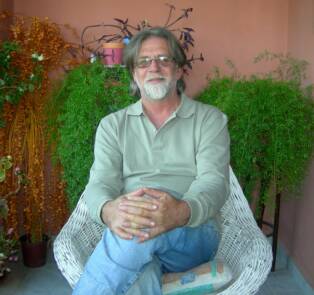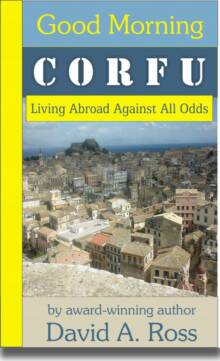© 2010 Moronic Ox Literary Journal - Escape Media Publishers / Open Books
Moronic Ox Literary and Cultural Journal - Escape Media Publishers / Open Books Advertise your book, CD, or cause in the 'Ox'
Novel Excerpts, Short Stories, Poetry, Multimedia, Current Affairs, Book Reviews, Photo Essays, Visual Arts Submissions
Interview
Review of Calico Pennants by David A Ross
(with author interview!)
Candy Beauchamp
I looked at the cover to this book and then read the description and then put it away. I recently pulled it back out and decided to give it a go. Honestly? I thought I’d get through the first chapter or two and toss it. Man, I read it nearly one sitting! This was absolutely fabulous! It’s more of a historical fiction, but there are two parallel stories going and they meet… I can’t say more without giving it away, but I hope the author will rewrite the description as it doesn’t do it justice at all!
The writing jumps off the page, I was in that cockpit, driving that plane. I even got a little queasy. No really. Okay, maybe not. But I was totally driving the boat and following along with all of the characters. What a fabulous talent this guy has. At one point I even gasped out loud. Honestly, this is some of the best “in the moment” writing I’ve read in a very long time.
I lived in Hawaii for several years and this brought back so many of the sights, sounds and smells. Either the author has been there or he’s done some serious research into it, which really makes me appreciate his writing even more. I also get the feeling he’s done a lot of research on Earhart as well, he had to have – either that or he has be totally snowed, because I’d swear I was reading a really good biography in some parts.
This is a great book for people who like the story of Amelia Earhart or just like a really good action book. I want to say more, but I can’t without spoiling it for you… just read it. Trust me.
Description:
In this award-winning novel, a weekend sailor shipwrecked in the South Seas eventually discovers the island’s only other human inhabitant—a woman who bears an uncanny resemblance to 1930s lost flying ace Amelia Earhart.
Rating: *****
Interview
I want to thank Mr. David Ross for taking time out to answer a few questions. I really did enjoy Calico Pennants and managed to connect with him and snag an interview.
Candy Beauchamp: Having lived in Hawaii myself, I found myself reliving parts of my life there, your descriptions were so dead-on. While I obviously didn’t know Amelia Earhart, I also felt like it was authentic, especially her back story. How much of this was research, real life experiences or just plain good writing on your part?
David Ross: As for the Hawaiian and South Seas descriptions, they were pretty natural to me having spent two months on several of the Hawaiian Islands. Anybody who has been there is drawn in by the breath-taking scenery and the fauna. The actual beach where Julian lands is taken from one on the North Shore of Kawai where the musical South Pacific was filmed. The promontory and the path leading to Amie’s compound are real places, and of course the scenes on Maui and the Big Island are drawn from authentic places, too.
As for the back story of Amelia Earhart’s last flight, I did a good bit of research about her and Fred Noonan, as well as George Palmer Putnam, who was Amerlia’s husband. I seem to remember reading five or six books, some of them biographical and others very speculative about what actually happened to the missing aviatrix.
CB: I understand there’s some interesting history and ironies in the writing of this book, can you talk a little bit about that and how this book came to be?
DR: The book was born of a momentary inspiration while I was staying in a guest house on the Big Island in Hawaii. In fact, I wrote the entire first chapter in one of those little books that B&B owners leave for their guests to sign. After the book was published in paperback, I received a letter from the B&B owner telling me how thrilled she was to have ‘the original’ manuscript of the first chapter, which in hindsight I guess is true.
But the writing of Calico Pennants hardly went off without a hitch. About halfway through the first draft (and I actually only wrote one draft of this book), another Amelia book hit bookstores. I WAS AMELIA EARHART was a first person account of Amelia’s ventures, and I felt devastated at being scooped, because after reading that book I knew mine was better – or at least more creative. I actually stopped writing for six months, and I considered shelving the manuscript to bring back in fifteen years or so; but telling my plight to a musician friend, she told me to get off my behind and finish the book. Which is what I did.
Strangely enough, I finished Calico Pennants just prior to a major contest deadline, so I entered the rough draft. The book placed third in the National Writers Novel Competition. Once it was actually published and in stores, it sold pretty well for an unknown novelist.
CB: For me, this was one of those books I felt like I was right there in the action with the characters, I was flying the plane and driving the boat. Did you set up for this to be an action adventure or more of a historical novel? Or was the merge of the two genres end up being a happy accident?
DR: Questions pertaining to genre have always been a sticky subject for me. Fact is that I never try to write in any genre. My books are what they are. So Calico was never meant to be an action/adventure, nor was it meant to be strictly historical. I do enjoy inserting real people from history into my books, though. I have done this on more than one occasion. As for the merger of genres being a happy accident, I’d say no. I try to be in full control of what is going on in my stories. Everything is pretty much there for a purpose. If anything, I saw Calico as a love story – an impossible one though it was.
CB: What do you most want people to walk away with from this book? Just a really good read or more? I know I took away a small message.
DR: Well, Calico Pennants is not what I’d call a heavy read. Yet, all my writing is done on multiple levels. This book can certainly be read on a literal level – at least if one can stretch his idea of reality a little – but it can also be read on several symbolic levels. Buenaventura, Julian’s sagacious parrot, can be taken as just a smart alec, or he can be seen as the novel’s God character. Amelia herself can be taken literally, or she can be taken iconically. But that’s how good literature is supposed to be, isn’t it?
CB: I understand from your website that you are in the process of writing your next (and last? true?) book. The title appears to be The Virtual Life of Fizzy Oceans *raises eyebrow*. Want to tell me a little about that? I couldn’t even begin to guess what it’s about…
DR: Ah, Fizzy Oceans! Fizzy is my alter ego. I am nearly 58 years old now. I have been writing novels since I was sixteen. I think every novelist, somewhere in his mind, sees the novel he is capable of writing. But, alas, it’s never that easy. You may write a good novel – even several good novels, but if you have not reached that pinnacle you imagine for yourself as a writer, you know it deep inside. The Virtual Life of Fizzy Oceans is, for me, that novel I always knew – or hoped – I could and would write. When you finally do it, you just know it.
The book itself is quite a monster. It should total out at 500 pages or more. I guess I have a lot to say this time around. It has a huge historical span, from pre-Biblical episodes, through the great civilizations of human history, on into the present and well beyond what we call modern existence. The novel is actually set in four different worlds – Natural Life, Physical Life, Virtual Life and Future Life. Physical Life is what most of us today call ‘Real Life’, whereas Virtual Life occurs in cyberspace. Fizzy is a pretty normal girl in PL, but she really shines in VL. I know it sounds strange, and it is strange. But it really works – at least I think so.
It’s true that I’ve said that The Virtual Life of Fizzy Oceans will be my last novel. I think that might be true. By the time it is published I will have written (and published) more than a million words. Maybe that’s enough for one writer. I keep thinking that if I haven’t said what I need to say in a million words, then there’s probably no hope. We’ll see. At any rate, whether or not it is my last novel, I will be taking a year or two away from writing. I usually do that between books. I may write some nonfiction next; we’ll just have to see.


David A. Ross
Other Titles from
David A. Ross
from
Open Books






